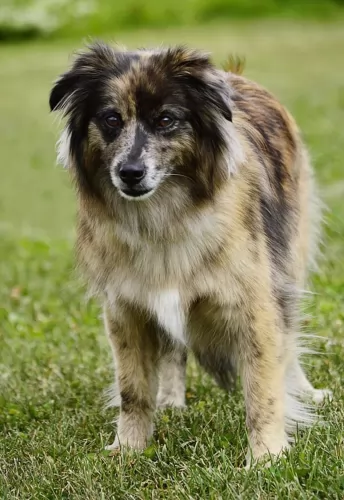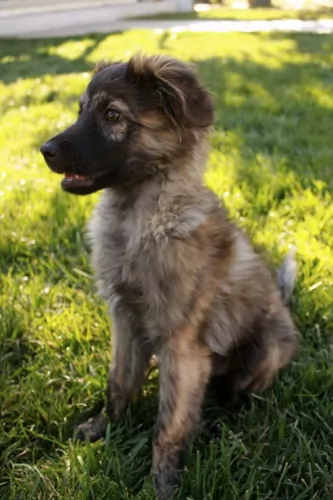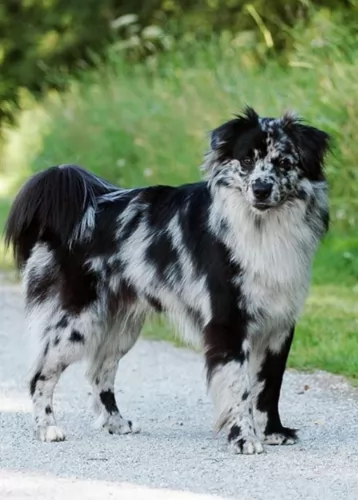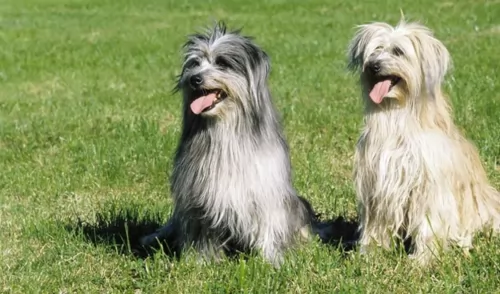 Petzlover
PetzloverPyrenean Shepherd is originated from Spain but Russian Setter is originated from Russia. Pyrenean Shepherd may grow 18 cm / 7 inches shorter than Russian Setter. Pyrenean Shepherd may weigh 12 kg / 26 pounds lesser than Russian Setter. Both Pyrenean Shepherd and Russian Setter has almost same life span. Pyrenean Shepherd may have less litter size than Russian Setter. Both Pyrenean Shepherd and Russian Setter requires Moderate Maintenance.
 The Pyrenean Shepherd hails from Spain where he has always been used to herd sheep. Some people believe he is a descendant of the French Catalan Sheepdog while others say from the Briard. Nobody is too sure.
The Pyrenean Shepherd hails from Spain where he has always been used to herd sheep. Some people believe he is a descendant of the French Catalan Sheepdog while others say from the Briard. Nobody is too sure.
He is actually the smallest of the French herding breeds. It is interesting to note that he still does this herding job today. It was in the 19th century that a few of these dogs left for America with shepherds who found work herding flocks in the American West.
These dogs were also used in World War 1 as messenger dogs.
It was during the 1970's and 1980's that breeding programs were started for the dog and The Pyrenean Shepherd Club of America was formed in 1987. The dog was also recognized in 2009 by the American Kennel Club.
People often think it is ridiculous that a Setter dog comes from Russia. It is believed that the Russians did have some kind of Griffon and the word Pointer is also often translated as Setter.
It is believed that the Russian Setter is one of the ancestors of the Wire-haired Pointing Griffon and that it possibly shared an ancestry with the German wire-haired and broken-haired pointers.
References to Russian Setters were fairly common in the 19th century, but there is such contradictory information that it is hard to get good information on the dogs. The Russian Setter is believed to have existed before the Russian Revolution resembling the English Setter. Dog experts tell us the dog no longer exists.
 The Pyrenean Shepherd is a medium-sized dog standing at between 38 and 50cm in height and weighing between 14 and 20kg.
The Pyrenean Shepherd is a medium-sized dog standing at between 38 and 50cm in height and weighing between 14 and 20kg.
His head is fairly small with large, bright, expressive eyes. The ears are semi-erect. The tail has always traditionally been docked but often left long these days.
He comes with two different coat types – rough and smooth with sometimes both types being in the same litter. The dog is a regular shedder. The coat can be medium length or long and slightly wavy with a harsh texture. The coat can be of the shorter type with finer, softer hair. The coat is available in different colors and patterns, and can be a fawn color or grey and you will find a black overlay occasionally with some white. The coat can be tri-colored or he can be in solid colors such as cream or white.
Your feisty Pyrenean Shepherd is a dog with plenty of personality. He is also full of energy and will love to live with a outdoorsy-type family who are always on the go, because he’s in on everything.
He is distrustful of strangers and this together with the fact that he is so alert, makes him a splendid watchdog too.
He will need to be trained and socialized as he can be overly robust. He becomes obedient and well mannered, being totally dedicated to his owner. It isn’t easy for him to be separated from his beloved human owner.
In terms of appearance, it was John Henry Walsh who said that the Russian Setter was a dog hidden by its long, woolly matted coat.It seems to have been a medium sized dog with an elegant appearance. It seems the dog came in two varieties - the curly coated liver coated dogs and the fawn colored dogs which are straight coated.
Because there is very little information on these dogs, we assume they were between 57 – 68cm in height and between 27 and 32kg in weight. The coat was no doubt in colours such as grey, reddish-brown with some black and white and shortish and wiry. The ears were floppy,and the face no doubt had some longer hair around the muzzle.
Nobody seems to know exactly what the temperament of this dog was, but when you look at some of his ancestors you can assume that he was strong-willed, confident and a skilled hunter.
He would have required a lot of exercise too. He was lively and energetic. Because he had Pointer in him you can be sure that he would have been intelligent so that he could be trained and socialized.
He would have been keen to learn with an owner who was firm and consistent in his treatment of him. He is a dog most happiest when he can spend time with his human family, a most loyal and devoted family friend, capable of getting on well with children and pets in the home.
 The Pyrenean Shepherd is essentially a one-person dog, becoming totally attached to one particular person in the family.
The Pyrenean Shepherd is essentially a one-person dog, becoming totally attached to one particular person in the family.
He is known as a dog who becomes totally loyal to his human family, getting on well with children as well as with other pets in the home.
He is aloof and wary of strangers. Training and socialization is important so as to avoid aggression and fear. This is one dog that requires being diligently exercised every day.
He is a great watchdog, and when you add up all his fantastic qualities, you get to realize what a splendid companion and pet this wonderful dog makes.
It appears, according to records that the Russian Setter has come and gone. However he would have been a calm, gentle pet with running ad hunting keeping him happy. He would therefore have required a lot of exercise.
We can assume that according to the few records that there are, that this was an affable, pleasing dog breed which made a great family pet.
 The Pyrenean Shepherd is such a jovial little dog that you just can’t imagine him ever being sick. When he is lethargic, you'll know there is something seriously wrong with him because he is always as bright as a button.
The Pyrenean Shepherd is such a jovial little dog that you just can’t imagine him ever being sick. When he is lethargic, you'll know there is something seriously wrong with him because he is always as bright as a button.
He can however get sick, and there are a few dog illnesses such as epilepsy, eye problems and hip dysplasia that can be very painful ad debilitating for such an energetic dog. You don’t have to be too concerned though, as he is a dog known to have minimal health issues.
The Russian Setter had an average lifespan of 10 – 14 which is a fairly good innings for a dog. Nonetheless you would have had to be aware of some common dog problem. These dogs were prone to major health issues such as both hip and elbow dysplasia, deafness, epilepsy and hypothyroidism.
The thyroid glands produce hormones that affect the function of many parts of the body. Dogs with this illness have a low production of thyroid hormones.
This disease is mainly caused by inflammation or shrinkage of the thyroid gland. The most common signs of low thyroid in dogs is thinning of the fur, the coat is dull, there is weight gain and excess shedding. The dog doesn’t tolerate cold well either. These dogs also often have ear infections.
 This will depend on the coat type. Both coat types will essentially require you brushing him twice a week.
This will depend on the coat type. Both coat types will essentially require you brushing him twice a week.
The Pyr Shep’s activity levels are very high and this dog will require living with people who love outdoor activities. He’s the perfect companion for those camping trips or hikes. He is always ready to join you on your walks and will be ready and waiting to jump right in when he sees you with a ball or frisbee.
For all that energy, your Pyrenean Shepherd will be needing the best dog food there is. Food full of preservatives and colorants can be bad for your pet, detrimental to his health.
Good food full of vitamins and minerals will ensure your pet stands a good chance of living a long, healthy life. If you feed him commercially manufactured dog food, ensure its the best there is, with labeling on the packaging that tells you its for his age, his size and energy levels.
Consistency and simplicity is what your Pyrenean Shepherd wants, and home-made food can enhance his dry kibble. Boiled chicken, brown rice or pasta and spinach, sweet potatoes and carrots all chopped up and mixed into the dry kibble once or twice a week will ensure your pet’s eyes are continuously bright and alert and his tail constantly wagging.
Some raw meat added in occasionally will also go towards ensuring his good health. Always make sure he has access to fresh, cool water.
Whatever kind of coat the Russian Setter ad it would have required a brushing twice a week to keep it in top form.
The medium length floppy ears would have to be checked inside for ear infection.
His owners would have checked inside the mouth for any signs of rotten or bad teeth.
His nails would have required trimming.
Dogs need the best food there is to stay healthy. The Russian Terrier, if it were still around today, would have had the best commercially manufactured food there was.
You want to provide dogs with some good homemade food too. Dogs thrive on simplicity and consistency to avoid upsetting the stomach. Some home-cooked food such as boiled chicken, sweet potatoes, brown rice or pasta, carrots and spinach would be perfect for him. Chop the food up finely and add it into the dry kibble once or twice a week. Raw meat should also be added in when possible to promote good skin health.
Make sure your pet is never without a constant supply of fresh, cool water.